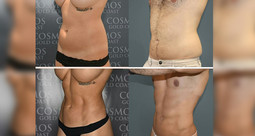Losing body fat involves several factors. While maintaining a calorie deficit is a common approach, weight loss can be influenced by various physical and psychological factors. If you’re not observing expected results, it might be helpful to re-evaluate your strategy.
When your low-calorie diet is translating on the scales
A common strategy for initiating weight loss is to create a calorie deficit, which can often be achieved by reducing daily calorie intake. The amount of reduction, however, varies depending on individual circumstances and should be approached with professional guidance. You may easily be able to achieve this by reducing your intake of refined carbs, cutting out soft drinks or watching your portion sizes. Combined with regular physical activity, a calorie deficit diet can result in fat loss. However, there are many factors in play that could be preventing weight loss.
Here are a few reasons why you might not be losing weight after cutting down your calorie intake.
1. You’re not eating enough calories
Yes, you read right. You may not be losing weight because you’re not eating enough. Your body requires a certain number of calories to perform. Eating too little impairs the body’s ability to function optimally.
Severely restricting calorie intake may lead to short-term fat loss, but it’s important to consider potential long-term effects such as changes in muscle mass, metabolic rate, and the body’s natural set points. Consulting healthcare professionals is advisable for sustainable weight management. Your body then adapts to this set point, requiring you to restrict your calories further to gain results otherwise you may find yourself in a weight loss plateau. This is one reason why most people experience weight gain after dieting.
2. Your diet is lacking nutrients
Adopting a low-calorie diet can result in a reduced intake of vital nutrients your body needs to function. They may not be directly hindering your weight loss, but it can lead to deficiencies. Some of the most common nutrient deficiencies caused by calorie-restrictive diets include protein, B vitamins, calcium and magnesium.
If sustained for too long, this can disrupt your body’s ability to digest food optimally, impair the detoxification pathways or cause a disruption in hormones – all of which can impair weight loss.
A diet can be both nutrient-poor and low-calorie. Ensuring your diet is balanced and nutrient-rich is going to help not only support your weight loss goals but also your overall health and wellbeing.
3. You’re stressed out
For some people, when they’re stressed, they lose weight quickly. For other’s the ‘fight or flight’ response and the increase in cortisol encourages their body to hold onto fat as a means of survival. After all, in a stressed-out state, your body doesn’t know when it is going to eat again.
Chronic stress also impairs digestion, disrupts sleep, leads to adrenal depletion, promotes sweet cravings and increases your food intake. All of which will make weight loss difficult.
4. You’re not being patient
So you’ve been on your low-calorie diet for 1 week. And your gym membership is seeing more use in the last month than it has in the year as you’ve increased your cardio sessions and bodyweight exercises. But there isn’t a change on the scale or you’ve noticed you’ve actually gained weight!
Unfortunately, you can’t force fat loss. Remember, you didn’t gain weight overnight so you’re not going to get in shape after being good for a week or two. Don’t let the slow process deter you from your weight loss efforts. Stick with it, even if you see fast results and then you plateau. Make sure you’ve addressed the other reasons why your weight loss may have stopped and give it more time.
Finally, aggressive dieting with severe restriction doesn’t work because it’s not sustainable long term and it doesn’t encourage you to build healthy habits that will enable you to maintain the weight loss.






